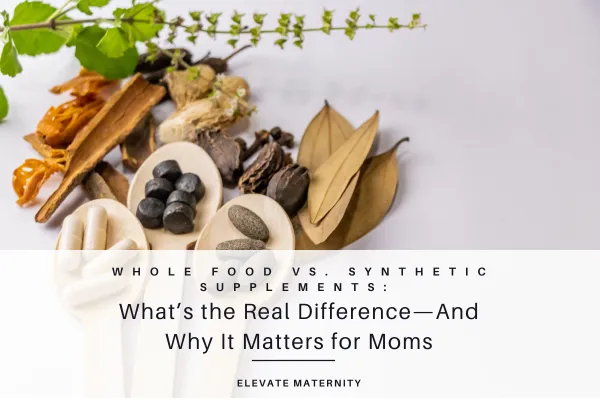
Whole Food vs Synthetic Supplements: What Moms Must Know
Whole Food vs. Synthetic Supplements: What’s the Real Difference—And Why It Matters for Moms
As a modern mother, your days are full—balancing career, family, self-care, and now, nurturing new life. Whether you’re preparing for pregnancy, recovering postpartum, or simply aiming to feel your best, nutrition matters more than ever. And when it comes to supplements, the choices can feel endless. But here’s something few brands are talking about: not all supplements are created equal.
The most important distinction? Whole food supplements vs. synthetic supplements.
In this guide, we’ll break down what sets them apart—and why the source of your nutrients can have a lasting impact on your energy, immunity, and long-term vitality, especially during motherhood.
What Are Whole Food Supplements?
Whole food supplements are derived directly from real, nutrient-rich foods—think fruits, vegetables, herbs, and superfoods. These supplements retain the full spectrum of naturally occurring vitamins, minerals, enzymes, and phytonutrients. They’re minimally processed to preserve the complex synergy that nature intended.
When you take a whole food supplement, your body recognizes the nutrients as food—which means better absorption, less digestive strain, and more sustainable energy. Imagine the difference between sipping fresh-pressed orange juice and popping a synthetic vitamin C tablet. The first is nourishing and bioavailable; the second is… just trying to keep up.
At Elevate Maternity, I believe your body deserves the real thing—especially when you’re doing the profound work of growing life, healing, or simply keeping pace with everything on your plate.
What Are Synthetic Supplements?
Synthetic supplements are manufactured in a lab to replicate isolated vitamins or minerals. These versions often come from petroleum-based chemicals, coal tar, or genetically modified sources. While they may resemble natural nutrients on a molecular level, they lack the full nutritional ecosystem—things like coenzymes, antioxidants, and fiber—that help your body absorb and utilize them.
That’s the key issue: without those cofactors, synthetic nutrients may not be fully absorbed. They can pass through your system unused or, worse, cause imbalances when taken in high doses.
For busy women who don’t have time to guess what’s working and what’s not, synthetic supplements simply don’t offer the reliability or long-term benefits of whole food alternatives.
Whole Food vs. Synthetic: The Real-Life Differences
Whole food supplements are derived from real fruits, vegetables, and herbs, offering nutrients in their natural, complete form—along with vital cofactors like fiber, enzymes, and antioxidants. This makes them more bioavailable, meaning your body can absorb and utilize them more efficiently. In contrast, synthetic supplements are created in laboratories using chemical compounds that mimic nutrients but lack the natural complexity your body depends on. As a result, they’re often less effective and harder to absorb. While whole food supplements work synergistically with your body for gentle, long-term support, synthetic options can sometimes lead to imbalances or side effects, especially in high doses. Choosing whole food-based supplementation ensures you’re getting nutrition that works with your body—not against it.
A Word From My Heart, as Both a Naturopath and a Mother
As someone who spends a lot of time in Facebook groups centered around motherhood—whether it’s fertility, pregnancy, postpartum, or general wellness—I see the same question pop up again and again:
“What’s the best prenatal vitamin to take?”
And every time, my heart sinks a little. The answers usually come in quickly, often well-meaning but uninformed—recommendations full of synthetic fillers, isolated compounds, and nutrients that, frankly, do more to pad a label than support a mother’s body.
As a naturopath, it’s hard to sit back and watch these conversations unfold—knowing that in many of these groups, I’m restricted from offering professional guidance. That’s exactly why I created this post. Consider it my answer. My way of gently stepping in with information that’s grounded in science, aligned with nature, and deeply rooted in care for mothers.
You deserve to know what’s in your supplements. You deserve to be empowered to choose better.
Why It Matters—Especially for Mothers
During pregnancy and postpartum, your nutrient needs increase. But so does your body’s sensitivity to what you put in it. Whole food supplements support your system gently, effectively, and holistically—providing key nutrients like iron, folate, vitamin D, and magnesium in forms your body recognizes and responds to.
Whole food supplements are also less likely to trigger nausea, headaches, or digestive issues—common complaints with synthetic options.
For high-performing women juggling demanding schedules, there’s no time for guesswork. Your supplement routine should be as efficient and intelligent as you are.
Choosing Supplements That Align With Your Body—and Your Values
Your health isn’t something you outsource to a label. At Elevate Maternity, I curate supplements made from whole, organic, and ethically sourced ingredients. No synthetic fillers, no shortcuts—just real nutrition that honors your body’s brilliance.
Whether you’re supporting fertility, navigating the shifts of pregnancy, or recharging postpartum, you deserve supplements that meet you where you are—with grace, strength, and integrity.
Final Thought: Nourish the Woman, Not Just the Mom
Whole food supplements don’t just fill nutritional gaps—they honor the whole woman. And when your health is supported from the inside out, you show up for yourself and your family with more clarity, confidence, and energy.
It’s not about taking more. It’s about taking what truly works.
Want My Prenatal Supplement Recommendation?
Looking for a prenatal vitamin you can actually trust? I’ve created custom Prenatal Paks using whole food, bioavailable supplements that I use in my own practice to support women through every stage of pregnancy.
Just send me a quick email with the subject line "Prenatal Pak Inquiry". Send me your full name, phone number, and let me know which trimester you’re in. I’ll reply with a direct link to the prenatal pak that’s right for you.
Email me at [email protected]
That’s it—simple, personalized support for a healthier pregnancy.
